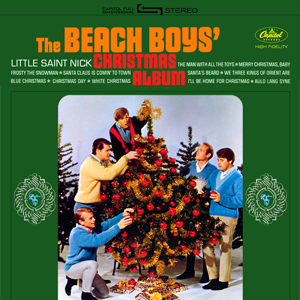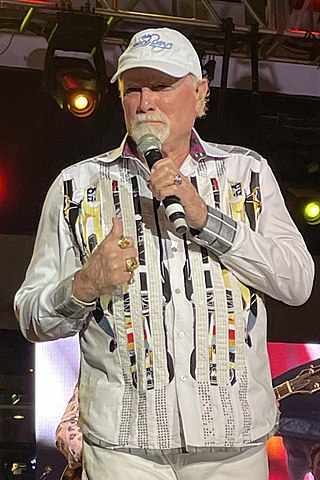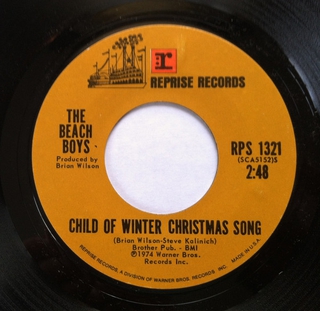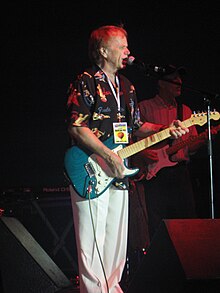
The Beach Boys are an American rock band formed in Hawthorne, California, in 1961. The group's original lineup consisted of brothers Brian, Dennis, and Carl Wilson, their cousin Mike Love, and friend Al Jardine. Distinguished by their vocal harmonies, adolescent-oriented lyrics, and musical ingenuity, they are one of the most influential acts of the rock era. They drew on the music of older pop vocal groups, 1950s rock and roll, and black R&B to create their unique sound. Under Brian's direction, they often incorporated classical or jazz elements and unconventional recording techniques in innovative ways.

Carl Dean Wilson was an American musician who co-founded the Beach Boys. He was their lead guitarist, the youngest sibling of bandmates Brian and Dennis, and the group's de facto leader in the early to mid-1970s. He was also the band's musical director on stage from 1965 until his death.

Sunflower is the 16th studio album by the American rock band the Beach Boys, released on August 31, 1970 on Reprise Records, their first for the label. It received favorable reviews, but sold poorly, reaching number 151 on the US record charts during a four-week stay and becoming the lowest-charting Beach Boys album to that point. "Add Some Music to Your Day" was the only single that charted in the US, peaking at number 64. In the UK, the album peaked at number 29.

Alan Charles Jardine is an American musician who co-founded the Beach Boys. He is best known as the band's rhythm guitarist, background vocalist, and for occasionally singing lead vocals on singles such as "Help Me, Rhonda" (1965), "Then I Kissed Her" (1965), "Cottonfields" (1970), and a cover of the Del-Vikings’ "Come Go with Me" (1981). His song "Lady Lynda" was also a UK top 10 hit for the group in 1978. Other Beach Boys songs that feature Jardine on lead include "I Know There's an Answer" (1966), “Vegetables" (1967), a cover of Buddy Holly’s “Peggy Sue” (1978), and "From There to Back Again" (2012).

The Beach Boys' Christmas Album is the seventh studio album by the American rock band the Beach Boys, released November 9, 1964 on Capitol Records. It contains five original songs and seven standards on a Christmas theme. The album proved to be a long-running success during subsequent Christmas seasons, initially reaching No. 6 on Billboard's Christmas LP's chart in its initial release and eventually going gold. Music historian James Perone wrote that it is "regarded as one of the finest holiday albums of the rock era".

20/20 is the 15th studio album by the American rock band the Beach Boys, released February 10, 1969 on Capitol Records. The LP was named for being their 20th overall release when factoring in live albums and compilations. Much of 20/20 consists of outtakes from earlier albums. It reached number 3 on UK record charts and number 68 in the U.S. Brian Wilson was absent during most of the album's recording after admitting himself into a psychiatric hospital, requiring brothers Carl and Dennis to retrieve several outtakes he had recorded years earlier. While Brian does not appear on the front cover, the inner gatefold of the original vinyl release features him alone, behind an eye examination chart.

Holland is the 19th studio album by American rock band the Beach Boys, released January 8, 1973 on Brother/Reprise. It is their first album recorded without Bruce Johnston since 1965, their second with Blondie Chaplin and Ricky Fataar, and their final studio album created under the de facto leadership of Carl Wilson and manager Jack Rieley. The LP was originally packaged with a bonus EP, Mount Vernon and Fairway, which consisted of a 12-minute fairy tale written and produced by Brian and Carl Wilson.

The Beach Boys Love You is the 21st studio album by American rock band the Beach Boys, released April 11, 1977, on Brother/Reprise. Sometimes called the band's "punk" or "synth-pop" album, Love You is characterized for its pioneering use of synthesizers and its juxtaposition of adolescent-oriented lyrics with the adult band members' gravelly vocals.

M.I.U. Album is the 22nd studio album by American rock band the Beach Boys, released on September 25, 1978. Characterized for its easy-listening sound, the album was produced by Al Jardine and touring member Ron Altbach during one of the most acrimonious periods in the band's history. It sold poorly, peaking at number 151 in the U.S, and was met with confused reactions from critics and fans.

Endless Harmony Soundtrack is an anthology album of previously unheard material by The Beach Boys, originally released by Capitol Records in August 1998. Named for Bruce Johnston's song on the 1980 album Keepin' the Summer Alive, it was designed as a tie-in with the band's biographical documentary of the same name. The soundtrack was re-issued in March 2000 with some remixing and different artwork, while the original 1998 edition went out of print shortly thereafter.
"Wake the World" is a song by American rock band the Beach Boys from their 1968 album Friends. It was written by Brian Wilson and Al Jardine about getting up in the morning for work. In addition to appearing on Friends, "Wake the World" was released as B-side to "Do It Again" in July 1968. The song has since appeared multiple times on the band's live setlists and has been described as a cult favorite.

"'Til I Die" is a song by American rock band the Beach Boys from their 1971 album Surf's Up, subsequently issued as the B-side of the single "Long Promised Road". With autobiographical lyrics about death and hopelessness, it is one of the few songs in which both the words and music were written solely by Brian Wilson. An extended mix of the original recording, created by engineer Stephen Desper, was included on the 1998 Endless Harmony Soundtrack.

"Slip On Through" is a song by the American rock band the Beach Boys from their 1970 album Sunflower. Written by Dennis Wilson and Gregg Jakobson, it was issued as a single with the B-side "This Whole World". It did not chart.
"Our Sweet Love" is a song by the American rock band the Beach Boys from their 1970 album Sunflower. Written by Brian Wilson, Carl Wilson, and Al Jardine, "Our Sweet Love" features a lush sound that has been compared to the band's work on Pet Sounds. Brian Wilson originally left the song unfinished, resulting in the band completing it for Sunflower. Carl Wilson sings the song's lead vocal.

Michael Edward Love is an American singer and songwriter who was the lead vocalist of the Beach Boys which he co-founded with his cousins Brian, Dennis, and Carl Wilson and their friend Al Jardine. Characterized by his nasal tenor and occasional bass-baritone singing, Love has been one of the band's vocalists and lyricists for their entire career, contributing to each of their studio albums and serving as their frontman for live performances. During the mid-1960s, he was one of Brian's main collaborators, contributing lyrics to hit records such as "Fun, Fun, Fun" (1964), "I Get Around" (1964), "Help Me, Rhonda" (1965), "California Girls" (1965), and "Good Vibrations" (1966).

"Child of Winter " is a song by American rock band the Beach Boys that was released as a standalone single on December 23, 1974. Written by Brian Wilson and Stephen Kalinich, it was the only Beach Boys single issued between the albums Holland and 15 Big Ones. The B-side was "Susie Cincinnati".
"Soulful Old Man Sunshine" is a song by the American rock band the Beach Boys that was recorded during the sessions for their 1970 album Sunflower. It was written by Brian Wilson, Rick Henn and veteran arranger/producer Don Ralke.
Merry Christmas from the Beach Boys is an unreleased studio album by American rock band the Beach Boys. Planned for issue in November/December 1978, the content was a mixture of original songs penned by the group and traditional standards, similar to their 1964 release The Beach Boys' Christmas Album.
"Brian's Back" is a song by American rock band the Beach Boys that was recorded in two versions during the sessions for Love's unreleased solo album First Love and the Beach Boys' 1979 album L.A. . Written by Mike Love and produced by Paul Fauerso, the song addresses the "Brian Is Back!" media campaign from 1976. The players on the First Love version included Carl Wilson, Ron Altbach, Dave Somerville, and Jerry Donahue.














